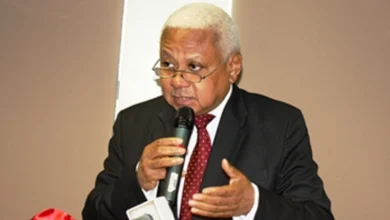Why prioritising international coverage lifts national sport spirits

Why Prioritising International Coverage Lifts National Sports spirits.
In the familiar tapestry of Tanzania’s athletic history, there is a figure whose exploits shine brighter than a supernova.
A man whose feats on the track could make a cheetah blush with envy.
Enter Filbert Bayi Sanka, Tanzania’s middle-distance megastar, who made running look like a stroll in the park.
An athlete who has left his mark on the world of middle-distance running like a graffiti artist with a can of neon paint.
Imagine, if you will, the year is 1974, when disco was king and bell bottoms as well as tight-fitting shirts were all the frenzy.
In the serene setting of Christchurch, New Zealand, Bayi stepped onto the track for the men’s 1500-meter final at the Commonwealth Games.
Now, ordinarily, a 1500-meter race is like a chess match on legs, with athletes strategising moves like grandmasters.
But not Bayi. Oh no…He had a different game plan that involved leaving his opponents in the dust quicker than you could say “sprint.”
From the get ready-set-and… go! Bayi shot out like a cannonball, leaving spectators rubbing their eyes in disbelief.
As he blazed around the track, it seemed like he was running on jet fuel and sheer determination.
When he crossed the finish line, the clock read a jaw-dropping three minutes and 32.2 seconds—faster than a cheetah chasing its morning espresso.
Bayi’s record stood tall for four decades, like a beacon of hope for aspiring runners everywhere.
But then came August 5th, 2022. A young guy from down under, Australia, to be precise, Oliver Hoare, decided it was time to give that record a run for its money. And boy, did he run!
With legs pumping like pistons and determination etched on his face, Hoare dashed across the finish line at three minutes and 30.12 seconds, leaving spectators wondering if they had just witnessed a miracle or a fast kangaroo.
As Bayi watched from the side lines, a mix of emotions washed over him—full of pride, admiration, and maybe, just maybe, a hint of envy…
How do I know all this? Well, yours truly was there, sitting side-by-side with Bayi at the Alexander Stadium in Birmingham, when the Aussie broke his 48-year-old record.
Watching your record get smashed is like watching your ice cream melt on a scorching sunny day—not exactly fun. But hey, at least you got to enjoy it while it lasted!
After all, legends never die. They pass the torch, or in this case, the baton, to the next generation of speed demons.
Now, let’s talk about the unsung heroes of this narrative — the journalists.
Introducing legendary journalist with the Daily News, Stephen Rweikiza. Armed with a camera, pen and determination to capturing Bayi’s historic moment for eternity.
At the end of the day, Rweikiza managed to capture and later successfully transmit Bayi’s images from New Zealand to Tanzania using wire photo and telex services – the internet was still a dream.
Rweikiza stood alone on the sidelines in New Zealand, capturing Bayi’s historic moment for eternity. A lone wolf in the wilderness of international competition, his lens capturing the glory that unfolded before him.
Had he not been in New Zealand, the coverage of Bayi’s triumph would have likely been significantly limited, particularly regarding Tanzania’s participation.
Without Rweikiza’s in New Zealand on that glorious day, the Tanzanian media might have struggled to provide comprehensive coverage of their athletes’ performances and achievements at the event.
In the absence of Rweikiza’s coverage, there would have been a dearth of first-hand accounts, interviews, and insights into the Tanzanian athletes’ experiences and accomplishments.
This could have also led to a lack of recognition for Tanzania’s efforts on an international stage.
The global media coverage may have overlooked Tanzanian achievements, as international media outlets don’t have dedicated sufficient resources to cover every participating country comprehensively.
As a result, the broader public, both domestically and internationally, might have missed out on stories of triumph and inspiration from the Tanzanian athlete.
Moreover, Rweikiza’s absence could have impacted the visibility of Tanzanian sports on the international stage.
And yet, here we are, over four decades later, with more reporters chasing after footballers’ haircuts than following the footsteps of our athletic heroes.
In other words, in the grand arena of international athletic competitions, Tanzanian national teams are like lone wolves howling in the wilderness, their activities echoing unheard across the globe.
Take, for instance, the just ended All-Africa Games in Accra, Ghana – a veritable carnival of talent – as a vivid example.
Tanzania, with 75 of our finest athletes competing in various disciplines, and yet, how many journalists were dispatched there to cover their exploits? Too few to count on one hand, if you ask me…
It is even hard to believe that we had sent teams that participated in Athletics, Bicycling, Swimming, Cricket, Under-17 Women football, and Boxing. Total black out!
Luckily, boxing was an exception, as was the women’s U-17 team, which managed to attract some local reporters; however, they flew off the moment the Tanzanite’s were eliminated.
Nobody could hold the scribes accountable or make them stay back to cover the rest of the games. They were self-sponsored by their private media, and perhaps by the Tanzania Football Federation.
Well, while the rest of the Tanzanian team floundered in a sea of miscommunication, the boxing contingent somehow managed to deliver a one-two punch of quality reporting.
Thanks to the President of the Tanzania Boxing Federation (BFT) Lukelo Willilo, who has taken it upon himself to lead the charge in both the ring and the press box.
Willilo has decided to be both president of the boxing body, which deals with the country’s amateur boxing, a reporter and PR guy. For good reasons.
Today, amateur boxing in Tanzania is stuck in the back seat, while pro boxing bathes in radiant glory. Who needs amateur fame when you can skyrocket to stardom overnight, right?
Ask Karim Mandonga; he probably used a shooting star as a stepping stone! The publicity that chased him was the last nail into Tanzania’s amateur boxing.
Had die-hard Willilo not been passionate with playing his part as president and communications manager, amateur boxing would have long gone extinct.
Jamani….! Let us bring an end to this do-it-yourself journalism and, and usher in a new era of professional and comprehensive coverage for all sports disciplines as was the case during Bayi’s era.
By investing in more reporters on the ground, we ensure that our national teams never again fade into obscurity, their victories lost in the mists of time.
It is not rocket science—more journalists mean more coverage, buzz, and opportunities to showcase our nation’s sporting prowess to the world.
Imagine the national sports team bedecked in national colours, stepping onto the field amidst a cacophony of cheers and camera flashes – minus their journalists!
The presence of journalists ensures that every moment of the athletic team’s journey is captured and immortalised in the annals of history.
From nail-biting victories to heart-wrenching defeats, these intrepid chroniclers spin tales that would make even Shaaban Robert blush with envy.
Beyond mere storytelling, journalists play the role of modern-day Cupids, forging connections between players and fans that transcend borders and languages.
Through exclusive interviews and insightful reporting, they bridge the gap between the locker room and the living room, transforming spectators into die-hard supporters.
And let us remember the invaluable gift of credibility that journalists bestow upon our beloved teams. Oh, how the athletes must be envying national football teams….
With their impartial coverage and eagle-eyed scrutiny, journalists also hold sports organisations and governing bodies to account, ensuring that fair play prevails, and scandals are nipped in the bud.
Without them wielding pens like mighty swords in the battle for integrity and transparency, victories go unnoticed, achievements uncelebrated, and egos left to wither like neglected houseplants.
And let us not even mention the perils of misinformation that lurk in the shadows.
Without journalists to separate fact from fiction, rumours run rampant, scandals brew like witches’ potions, and the truth becomes as elusive.
More so, in this digital age of tweets and Instagram and Facebook, let us not underestimate the power of social media to spread the word far and wide at lightning speed!
With a well-timed hashtag and a viral video, we are assured that the achievements of our national teams resonate across the globe, inspiring generations to come with a shared love of sports.
Without serious involvement of the journalists, and willingness of the powers that be to send them to brave the side-lines, the world of sports would be a much duller place indeed.
So, here is to the few unsung heroes of sports journalism, the brave souls who risk life and limb (and the occasional dodgy hotel buffet) to bring us the latest scoop from the frontlines of athletic glory.
Like the way Daily News’ own Stephen Rweikiza and others like him did to all sports disciplines during those golden times….





